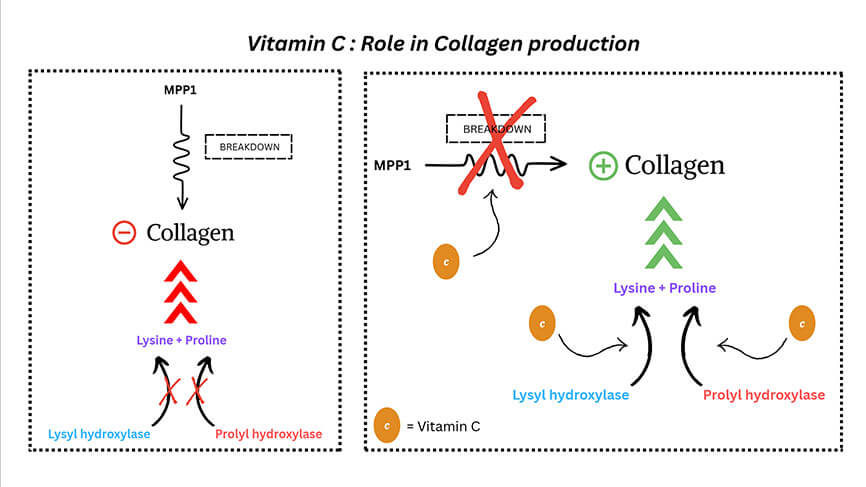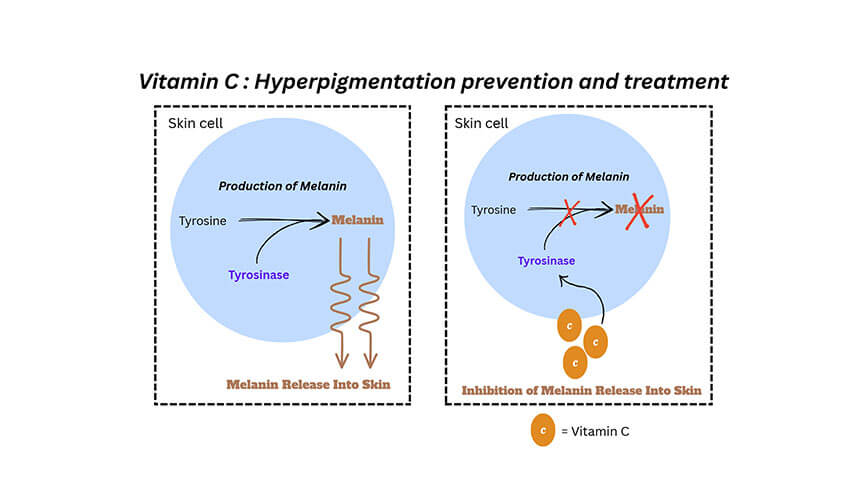What Is Vitamin C?
Vitamin C-also known as ascorbic acid-isn’t just a supplement you reach for during cold season. It’s an essential nutrient your body needs for immune function, collagen production, wound healing, and antioxidant defense. Since our bodies can’t produce it naturally, we must get it from external sources like fruits and vegetables-think citrus, strawberries, bell peppers, and kiwis.
In skincare, Vitamin C is used in topical form to deliver its benefits directly to the skin. But not all forms are created equal.
Topical Vitamin C: The Power of Ascorbic Acid
Ascorbic acid is the most biologically active and studied form of topical Vitamin C. It absorbs well, has an array of benefits and works quickly—when formulated correctly. It typically needs a low pH to remain stable and effective, but this acidity can sometimes lead to irritation, especially for sensitive skin. It’s also highly unstable and prone to oxidation, making packaging and formulation critical.
This is where Vitamin C derivatives come into play—they aim to deliver similar benefits, but in a gentler, more stable format.
The Case for Derivatives: Why Not Always Ascorbic Acid?
To address the instability and potential irritation of pure ascorbic acid, several derivatives of Vitamin C have been developed. These forms are often more stable, better tolerated by sensitive skin, and easier to formulate. While they must be converted into active ascorbic acid within the skin to deliver their full benefits, they provide targeted advantages depending on their structure and solubility. Here are three key derivatives worth knowing:
- Ascorbyl Glucoside: A water-soluble derivative formed by bonding Vitamin C to a glucose molecule. Ascorbyl Glucoside is notably more stable than pure ascorbic acid and significantly less irritating, making it a good option for sensitive skin types. It offers both antioxidant and anti-inflammatory properties, and also provides hydration. To become active, it must be converted into ascorbic acid by the skin’s alpha-glucosidase enzymes.
- Ascorbyl Palmitate: is a fat-soluble form of Vitamin C created by combining ascorbic acid with palmitic acid, a fatty acid. Its lipophilic structure allows for easier absorption through the skin barrier. When used at higher levels (1%–2%), it functions as an active antioxidant. However, due to it’s modified chemical structure, it offers limited protection against oxidative degradation, making it less stable in the long term compared to other derivatives.
- Ascorbyl Tetraisopalmitate: One of the most advanced derivatives. This form mimics many of the physiological effects of pure Vitamin C, including brightening and antioxidant protection. It penetrates the skin efficiently and is enzymatically converted into ascorbic acid within skin cells. It can be used at higher concentrations without irritation and is compatible with formulations at a pH above 5, making it ideal for a wider range of product types.
Why Use Vitamin C in Skincare?
Vitamin C is one of the most versatile and well-researched ingredients in skincare. Here’s what it does:
- Stimulates collagen production: Vitamin C is essential for the enzymes that build collagen, helping improve firmness and elasticity, and a key player in preventing collagen breakdown.
In our Pro-Aging line, both night and day creams incorporate ascorbyl tetraisopalmitate to target signs of aging without compromising comfort or hydration. Suitable for all skin types, the Day Cream smooths, plumps, and brightens with peptides, hyaluronic acid, and camellia oil. The Night Cream deeply nourishes and evens skin tone, supporting overnight regeneration with hyaluronic acid, and botanical oils. With continued use, skin appears visibly smoother, more radiant, and revitalized from morning to night.

- Fights pigmentation and Brightens skin: It reduces the appearance of dark spots and evens out skin tone, by inhibiting tyrosinase, the enzyme involved in melanin production.

We recommend using our Bright Care Ultimate Glow Face Serum, a multi-corrective concentrate designed to visibly reduce skin irregularities and enhance luminosity. With a carefully curated blend of ascorbyl tetraisopalmitate, niacinamide, tranexamic acid, brightening peptides, and hyaluronic acid, the skin appears visibly plumper, more even, and deeply hydrated with frequence of use. Its refined, gel-like texture glides effortlessly across the skin, leaving behind a soft veil of comfort and a healthy, dewy finish. Suitable for both day and night use, and for all skin types.
- Protects from free radicals: As a powerful antioxidant, it neutralizes oxidative stress from pollution, UV rays, and other environmental aggressors. Free radicals are unstable molecules that lack an electron. To stabilize themselves, they “steal” electrons from healthy molecules—such as those in your skin cells—leading to damage and accelerating skin aging. Antioxidants like vitamin C step in by donating an electron to neutralize free radicals, helping to protect your skin from oxidative stress.

- Strengthens the skin barrier: It supports ceramide synthesis and speeds up wound healing.
- Calms inflammation: Its anti-inflammatory properties make it suitable for redness-prone or acneic skin.
Our Instant Rich City Shield day cream, is formulated to protect against urban stressors. This advanced day cream offers SPF 20 UV protection (PA+++) while delivering intense hydration and antioxidant defense. Ascorbyl tetraisopalmitate, hyaluronic acid, and a 100% vegetal bioactive complex work together to smooth fine lines, enhance the skin’s barrier function, and promote long-term clarity. The light, fluid texture absorbs quickly, leaving the skin supple and velvety—perfect for daily wear under makeup or alone.
How to Add Vitamin C to Your Skincare Routine and Precautions
Vitamin C is especially useful for skin that is dull, uneven or starting to show signs of aging. Use it in the morning for an extra antioxidant protection boost with your sunscreen, and at night to help heal and repair the skin. And of course, don’t forget that skincare doesn’t just stop at the face, our scalp and hair can benefit from it too!
Binggys Permanent Hair Color Cream nourishes each strand with a powerful blend of ascorbic acid (vitamin C), oleic acid, and Q10, helping to protect, soften, and delay onset hair greying. Paired with the Bond Re-Plex balm, enriched with amino acids, it strengthens and restores the hair’s vitality. Binggys Permanent Hair Color Cream delivers rich, long-lasting color with a natural finish—in just 30 minutes.
Ascorbic Acid (pure Vitamin C) should be used with caution on the skin. Avoid layering it with ingredients like benzoyl peroxide or copper peptides, and don’t apply it on already inflamed or compromised skin. For irritated skin, prioritise using the derivative forms of vitamin C. Additionally, a little goes a long way, 2–5% is often enough to see results without overwhelming the skin.
And remember : Always store vitamin C products away from direct light and air to prevent oxidation and retain its potency. Keep those precious formulation away from heat too!
Disclaimer: This article was written with the support of artificial intelligence (AI). However, all information presented is based on verified scientific sources and has been fact-checked and reviewed by the researchers on our team. We are committed to maintaining accuracy, credibility, and scientific integrity in all published content.




